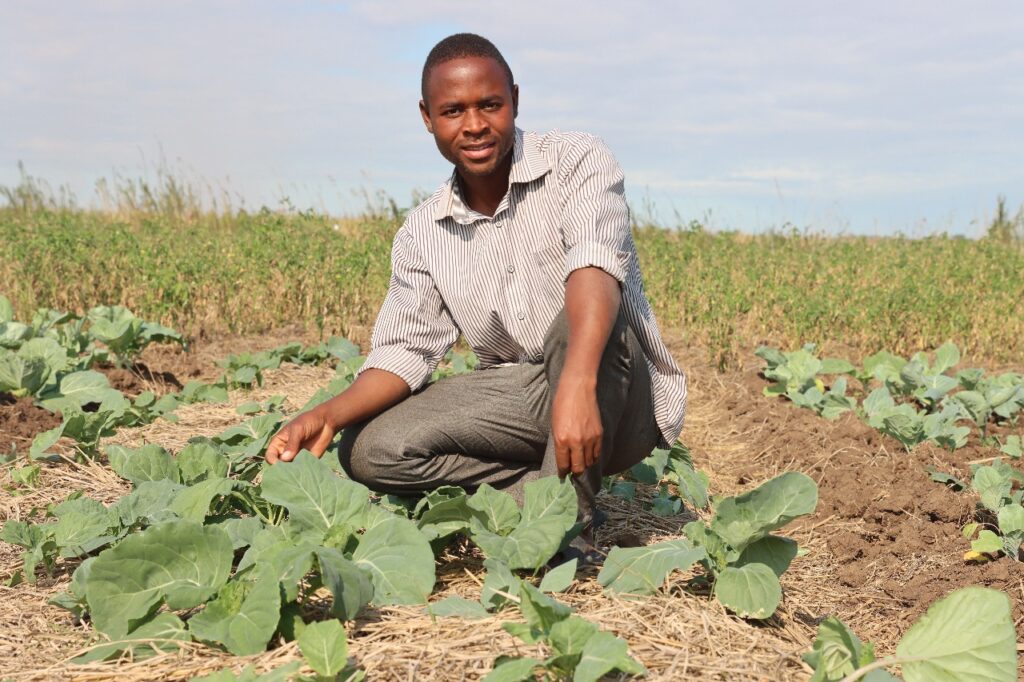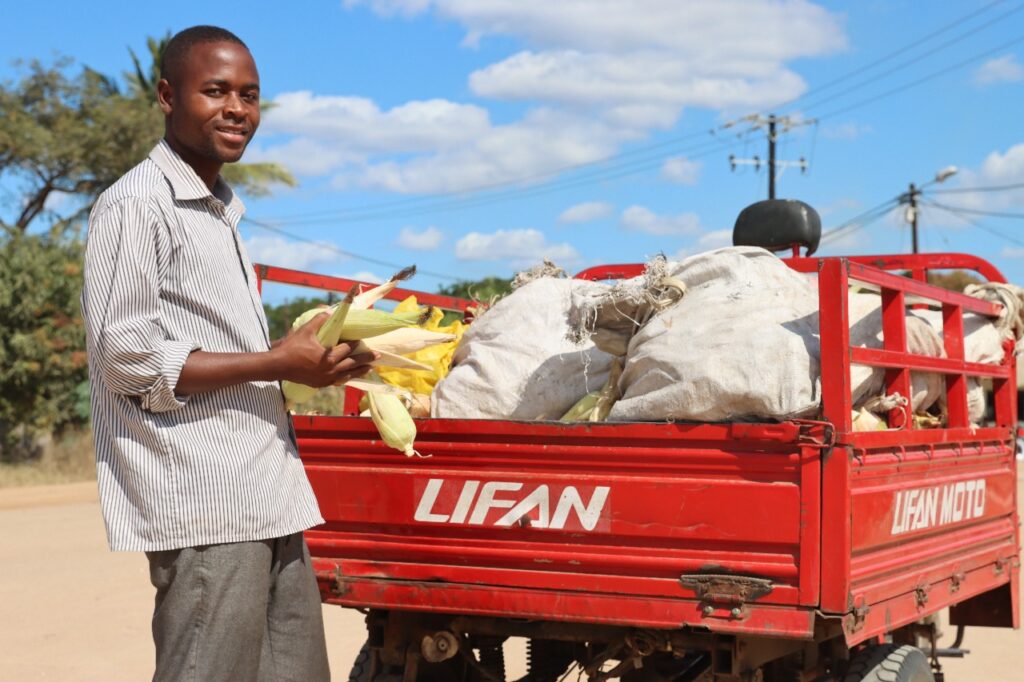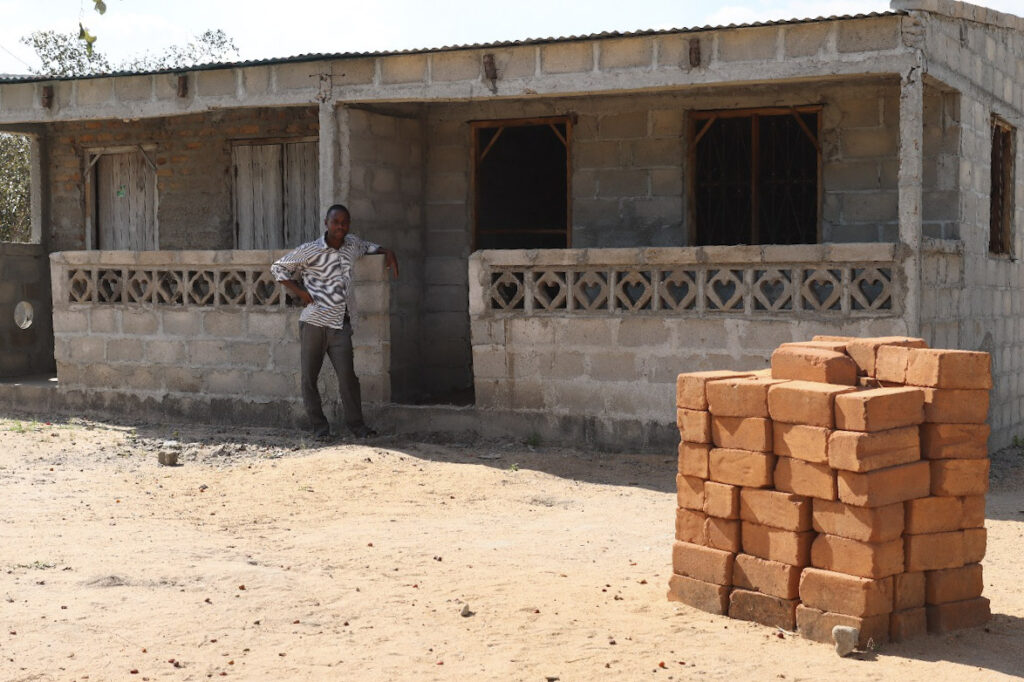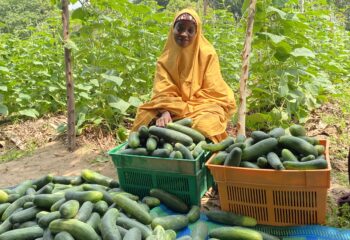
At 33 years old, João Augusto Maré is helping to build more resilient and inclusive agricultural systems in the Buzi District of Mozambique with support from IFDC projects in the country.
Maré’s involvement in IFDC-led activities dates back to 2020, when he participated in both the Food security through climate Adaptation and Resilience (FAR) program and, later, the Transfer Efficient Agricultural technologies through Market Systems (TEAMS) project, in which he and 14 other farmers came together to form the Gonda Kurima Association, a farmer group associated with producing rice, horticulture crops, and more, in Guara-Guara, Buzi District.
Recently, the Triple Resilience (3R) program has assisted Maré and the Gonda Kurima Association in growing its group by expanding membership, strengthening organizational capacity, and continuing to improve farmer’s knowledge on agricultural practices, inputs, and markets.
“I bought land, built my house, and my children are in school. Before IFDC’s intervention, it wasn’t possible.”
João Augusto Maré
The 3R program builds on the foundations of previous programs – including the FAR program, followed by TEAMS – to strengthen local systems across climate, economic, and social pillars. The program and its technicians provide training and technical assistance while connecting its partners with input suppliers and markets.
Along with 3R, Maré is addressing Mozambique’s current challenges in agricultural production, such as access to inputs and rural logistics.

From 2020 to date, the association has admitted 15 more members, reaching a total of 80% women in the group. The association serves as a school for farmers, where they acquire skills in good agricultural practices, climate-smart agriculture, and sustainable natural resource management.
Maré notes that, although different programs have come and gone, IFDC has remained helpful and supportive, providing technical guidance, funding, and agricultural innovations. “When we call, they come to the field,” Maré declared.
IFDC’s commitment to empowering youth has helped João Augusto Maré grow into a trusted leader, both within the Gonda Kurima Association and as a reliable agricultural transport service provider.
Before the conclusion of the TEAMS project, Maré received a motorcycle through a competition hosted by IFDC that enabled him to transport agricultural products with ease, connecting farms to markets more efficiently. Today he assists 34 producer associations in Buzi District, moving an average of 200 kg per trip.
Maré transports seeds, seedlings, fertilizers, pesticides, and harvested agricultural products, reducing farmers’ production costs and improving their access to markets, even those farther away with better prices.

Most transporters charge around 700 MZN (approximately U.S. $10.86) for a 4‑km trip, but Maré charges, on average, 600 MZN (approximately U.S. $9.30) for the same route. Additionally, he offers flexible payment terms, making it easier for producers with fewer resources to access transport services. Maré’s more affordable prices and flexible payment options, combined with the motorcycle’s efficiency, put his service in high demand.
“I carry maize, beans, fertilizers, whatever is needed,” Maré explained. “Even when someone can’t pay immediately, I usually let them take it on credit and expect them to sell and pay later.”
In the past year, Maré earned more than 100,000 MZN (approximately U.S. $1,551.35) from agriculture and transport services. With part of this income, he built his own house, and decided to invest in a small condominium project to generate additional income. He has also ensured his first- and seventh-grade children’s education.
“I bought land, built my house, and my children are in school,” Maré shared. “Before IFDC’s intervention, it wasn’t possible.”
Maré’s work demonstrates how young people can play a practical and strategic role in rural resilience. By combining agricultural production with affordable services and supporting other farmers, he shows how local youth leadership can drive meaningful change for the better.
About the Triple Resilience (3R) project
The Triple Resilience (3R) program (2023-2027) aims to build and strengthen social, climate, and economic resilience in Mozambique by accelerating the shift from humanitarian aid to long-term sustainable development. 3R is funded by the Embassy of Sweden and is implemented by IFDC in partnership with Norwegian People’s Aid (NPA), Associação Kwaedza Simukai Manica (AKSM), LevasFlor Foundation, União Provincial Dos Camponeses De Manica (UCAMA), União Provincial de Camponeses de Sofala (UPCS), and the International Economic Cooperation Institute (ICEI).
About the Transfer Efficient Agricultural Technologies through Market Systems (TEAMS) project
The Transfer Efficient Agricultural Technologies through Market Systems (TEAMS) project (2021-2023) was an Embassy of Sweden-funded program that aimed to increase food availability and access for 15,500 farmers in Mozambique with a focus on women’s economic empowerment through agriculture. The TEAMS project was a continuation of the FAR project which aimed for increased food availability and access for 15,500 smallholder farmers (60% women) in Mozambique.
About the Food Security Through Climate Adaptation and Resilience (FAR) project
The Food Security Through Climate Adaptation and Resilience (FAR) project (2017-2022) was a Swedish International Development Cooperation Agency (Sida)-funded integrated program that aimed to improve food security and resilience to climate shocks for 30,000-45,000 smallholder farmer households in the provinces of Manica and Sofala in Mozambique.




